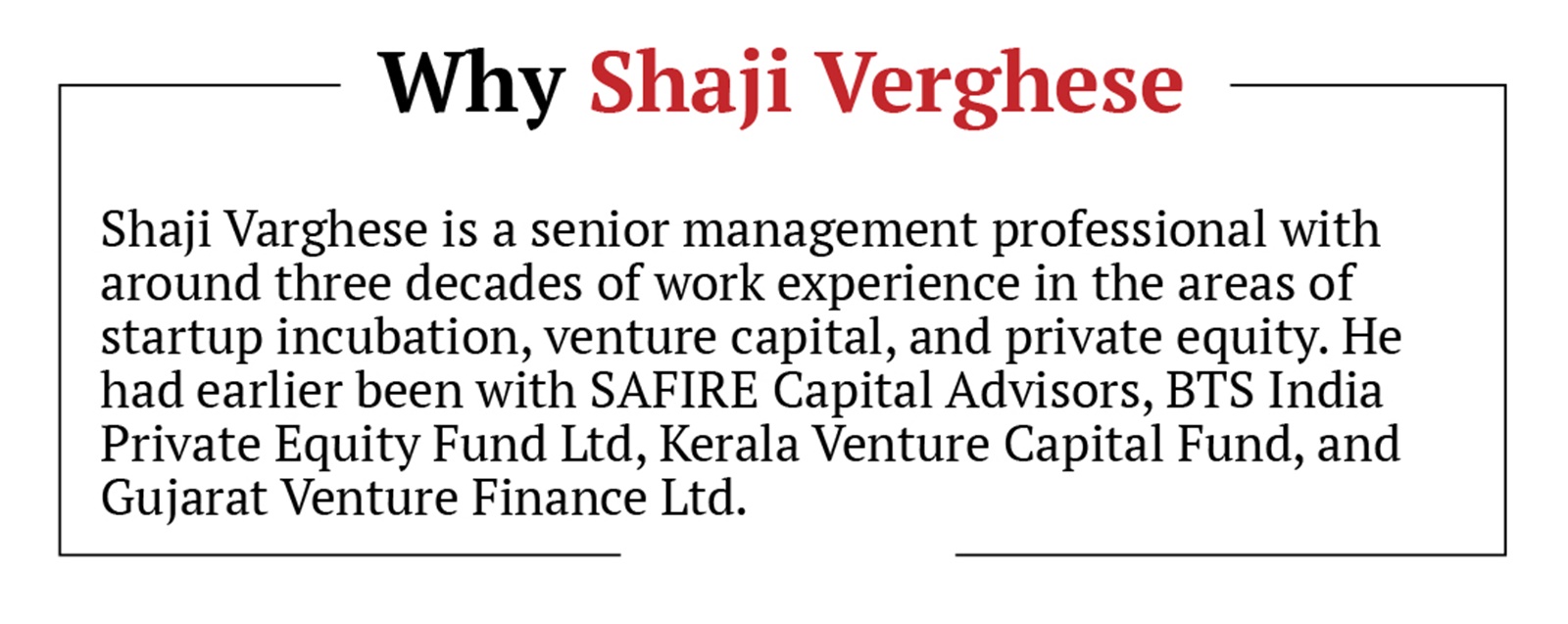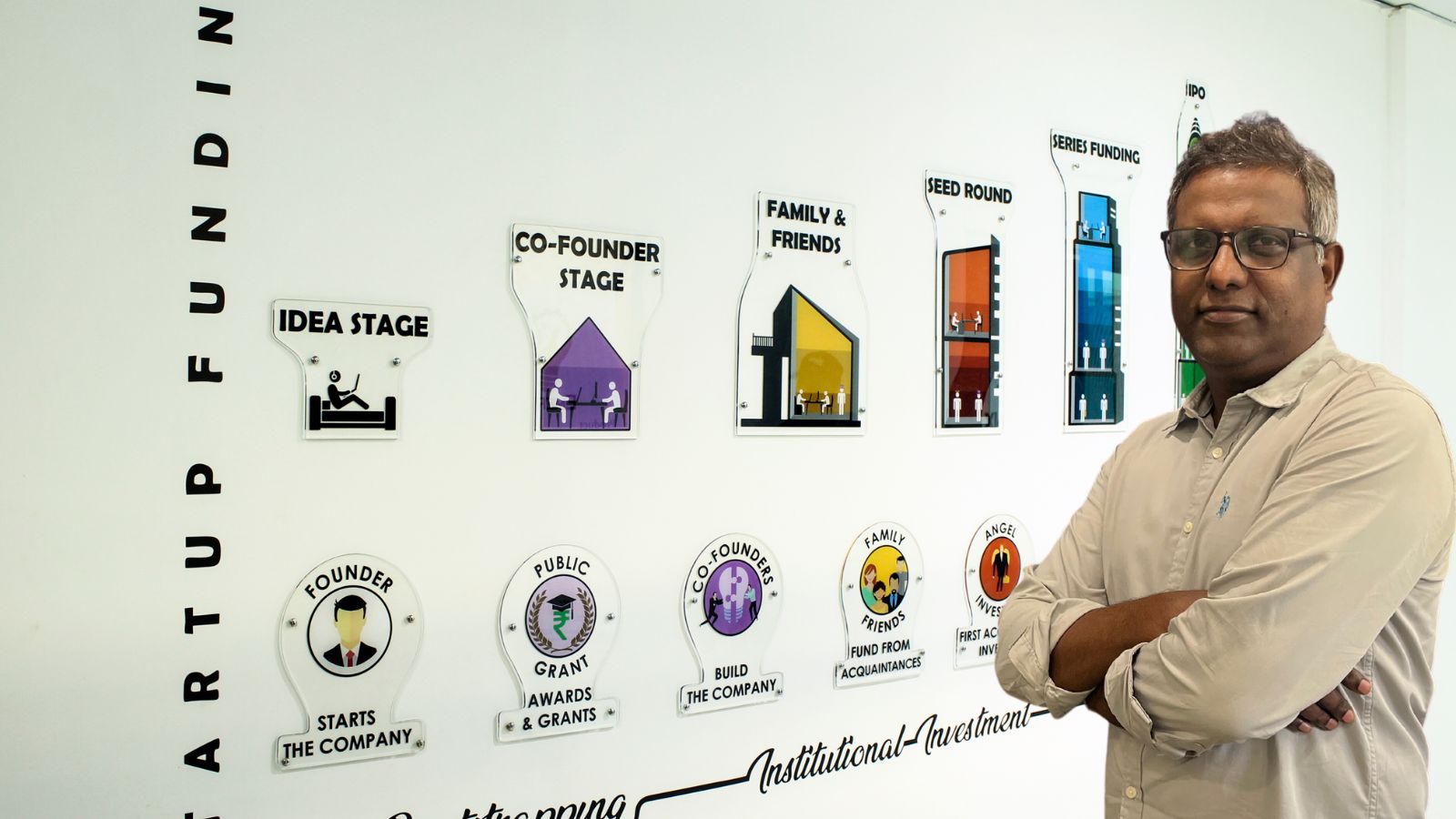Shaji Varghese is the CEO of the Society for Innovation & Entrepreneurship (SINE), an umbrella organisation at IIT Bombay that fosters entrepreneurship and nurtures tech start-ups. SINE began operations in 2004 and is a pioneer in the startup incubation ecosystem in India.
SINE is a technology business incubator facilitating the conversion of research activity into entrepreneurial ventures. It works with companies, governments, institutions, and international organisations. It is also an implementation partner of the Department of Science and Technology to run its nationwide programmes for funding innovators and helping them convert their ideas to prototypes. SINE has also set up a BIO-Incubator (BioNest) to encourage MedTech entrepreneurs and is also the programme management unit (PMU) for government’s PRomoting and Accelerating Young and ASpiring technology entrepreneurs (PRAYAS), an initiative, under the Department of Science and Technology.
Shaji Varghese spoke to indianexpress.com on the challenges of running a deep tech incubator, the philosophy of SINE in investing time and effort on startups, and the innovations from SINE that have made a significant social impact. Edited excerpts:
Shaji Varghese: We are among the pioneers in the development of the incubation ecosystem in India. We mentor and help build startups with a strong focus on intellectual property. We look for startups that over a period of time would also generate substantial economic returns in terms of jobs and social impact. We also partner with the government in implementing their incubation, training, and other startup support initiatives. However, we are not an accelerator per se, though we have done some acceleration programmes.
We are among the few incubators in the country where startup founders spend an average of three to five years. Nowadays, the trend in incubation is programme-based and sometimes it is as low as three months. The startup is in the incubation support programme for three to six months, and then it leaves. However, we still stick to a three- to five-year window. The startups come to us at a proof of concept stage and they leave us when they are either revenue-generating or self-sustaining. That is how we differentiate ourselves in this incubation space.
Our experience is unmatched as we are among the very first movers. For example, the failure rate for our startups is only 20 per cent, but if you look at the market numbers, the failure rate is 80 per cent. We understand the founder mindset and startup landscape, and we intervene at the right time. Since our focus is on intellectual property, only core tech startups come and remain with us.
We are sector- and theme–agnostic. Since we are linked with IIT Bombay, which is an institution with 15 departments and 20 interdisciplinary department themes and subjects, with substantial technical knowledge and expertise, it is not appropriate to say that we would work only on some themes. Almost 40 per cent of our startups are by students, alumni, and with faculty involvement. About 20 per cent would have a faculty co-founder or deep faculty involvement. We also pick up a small stake in the startups that we incubate.
Our startups span the whole spectrum of tech but over the last four years, many startup founders have come to us with ideas in the healthtech or medtech space.
Venkatesh Kannaiah: How big is SINE-IIT in numbers, people, funding, startups mentoring, further fundraise by startups etc?
Shaji Varghese: We have so far supported 236 startups, which over time have raised around Rs 6750 crore from the market. The valuation of our startups is at Rs 27,000 crore. We also have around 300 intellectual patents in the name of our startups.
Venkatesh Kannaiah: Can you tell us about a few innovations with social impact that have emerged out of your various programmes?
Shaji Varghese: Some of our startups have been pioneers in many fields. ideaForge is a pioneer in introducing drone tech in India. It is a leader in the Indian unmanned aircraft systems (UAS) market and has a large operational deployment of indigenous UAVs across India. The company is now ranked 5th globally in the dual-use category (civil and defence) drone manufacturers as per industry reports. Their drones are used in land surveys, planning and mapping of mining areas. Capable of volumetric estimations, they can help streamline oil and gas operations. These drones assist in the detection of issues in oil rigs, pipelines and leaks.
 Varghese says SINE is among the pioneers in the development of the incubation ecosystem in India.
Varghese says SINE is among the pioneers in the development of the incubation ecosystem in India.
NCF Green is using a technology indigenously developed at IIT Bombay. It produces and uses Carbon Nano Florets coating for the conversion of solar energy to thermal energy. It is close to commercialisation now. NCF (Nano Carbon Florets) boasts exceptionally high solar to thermal efficiency. The high conversion efficiency of the coating allows the use of this material in a variety of products targeted at providing heat, which also minimises energy consumption.
Voltrez Tech is a lithium-ion battery startup. Lithium-ion batteries catch fire due to dendrite formation, and many researchers are working to resolve this issue. The tech for this startup, which reduces the formation of dendrite and makes the lithium-ion battery safe and long-lasting, was developed within IIT B. A large pilot is going on for this tech, and if it works out and scales, it would be quite an innovation.
Venkatesh Kannaiah: Can you tell us about a few of your startups that have created substantial social impact?
Shaji Varghese: ImmunoACT is a biotech company focussing on CAR-T cell therapy for blood cancer. Cancer treatment remains a challenge through conventional therapies leading to high mortality. CAR-T cell therapy, a type of cell and gene therapy, is very expensive in India though it is highly effective in curing certain cancers like leukemia and is a globally proven technology. ImmunoACT’s patented CAR-T cell platform provides a unique design algorithm to develop novel, high-quality affordable CAR-T cells. This would be a game-changer.
Emergy Enviro is a sewage and wastewater treatment startup, using low power and chemical usage. EMERGY works in the wastewater, air, solid waste, pollution load assessments, and natural treatment systems space. They have built products which work on integrated wetland technologies, odour control equipment, and indoor air quality control tech.
Chainworks is a startup which uses blockchain for organ transplant management. Its solution for secure organ tracking and hospital registration is being used by the government of Maharashtra. Their blockchain-based solutions handle different aspects like donor-recipient matching and transplant auditing.
Lifespark is one of our startups which works on solutions for Parkinson’s disease patients. The patients wear a kind of pad on their knees and when there is a danger of them falling, an electrical stimulation is sent out to certain muscles, which can help them regain control and prevent their fall. Lifespark Technologies creates solutions for care in chronic neurological conditions such as Parkinson’s disease, spinal cord injury, and more.
HaystackAnalytics is a company working on genome-based solutions for TB and has developed the first Universal Infectious Disease (ID) genomic test. The test deploys Next-Generation Sequencing (NGS) technology to identify existing and emerging infections while providing information on drug resistance to support and identify the correct treatment options for patients. Its diagnostic solution for tuberculosis was recognised as one of the top innovations supported by the Biotechnology Industry Research Assistance Council- BIRAC.
Venkatesh Kannaiah: Can you tell us about a few of your very successful startups in terms of valuation or revenues?
Shaji Varghese: Gupshup is one of our startups in the conversational AI space which went on to become a unicorn. It provides automated chatbot-based support, a bot development platform and vertical-specific bots with Artificial Intelligence/Natural Language Processing. Such systems are being used for support field teams, lead generation, onboarding, registration, order tracking, and refunds.
Interestingly, they worked with the Madhya Pradesh government during the 2023 state elections. The chatbot built by Gupshup addressed queries including voter list verification, polling location enquiries, and clarification on acceptable identification documents such as Aadhar cards. They have also worked with the Tamil Nadu government on skill development and as a job finder.
There is also SEDEMAC which produces control systems for two-wheelers, three-wheelers and gensets, improving their efficiency. More than five million vehicles on roads have used this, improving the efficiency of the motors.
 “We were among the first to come up with a sustainable revenue model which was followed by other incubators,” Varghese says.
“We were among the first to come up with a sustainable revenue model which was followed by other incubators,” Varghese says.
Venkatesh Kannaiah: Can you tell us about one or two of your initiatives which you think are a very long bet, and if they work out will create a huge social impact?
Shaji Varghese: Inspecity, an IIT Bombay student startup has the motto of building cities in space. For now, they are looking at orbital vehicles, which would in the future lead to easier and better maintenance of satellites. These orbital vehicles would have robotic arms and computer vision, and would be sent to space to service satellites. It is quite an interesting team.
Advanced Renewable Tandem-Photovoltaics (ART-PV) is one of the projects we are incubating. The startup is working on Perovskites Solar Cell (PSCs) technology which has higher efficiency compared to silicon wafer. They are looking to use Perovskite solar cells, instead of silicon wafers for solar power generation. It is an outcome of the work that has been going on in IIT Bombay labs. Even globally, the tech is at a nascent stage. We see good progress. It should have a significant social impact when it scales up.
Venkatesh Kannaiah: Can you name a startup which was ahead of its time?
Shaji Varghese: One startup that comes to mind is H2E power, which spoke about green energy through Hydrogen much before it became a buzzword.
Venkatesh Kannaiah: What do you think has been your impact on the innovation ecosystem in India?
Shaji Varghese: We were among the first to come up with a sustainable revenue model which was followed by other incubators. When we began there was no playbook but now, our systems, processes and documentation are being taken up by others. Our focus on product-driven, IP-led startups has paid off.
 Unmanned Aerial Vehicle The latest drone news
Unmanned Aerial Vehicle The latest drone news




